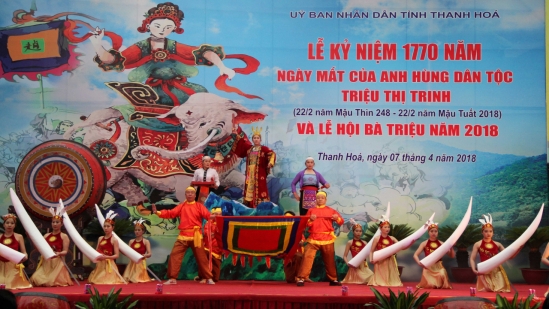
A festival opened in the northern central province of Thanh Hoa on April 7 to commemorate Trieu Thi Trinh, revered as Lady Trieu, who led a rebellion against the Chinese occupation in the third century.
|

The re-enactment of Lady Trieu's
uprising
The festival is taking place at a temple dedicated to the
national heroine in Trieu Loc commune of Hau Loc district and was attended by
National Assembly Chairwoman Nguyen Thi Kim Ngan.
On the opening day, a number of rituals were performed, incense
was offered and an invocation was delivered to mark the 1770th anniversary of
Lady Trieu’s death.
As part of the festival, local artists re-enacted the heroine’s
life during the uprising against the state of Easter Wu, which then ruled
northern Vietnam, and performed dances and songs in praise of the Vietnamese
women’s contributions to national construction and defence.
The festival, which lasts for three days, also includes an
exhibition on the beauty of Thanh Hoa to promote tourism in the province.
|
Source: NDO
With an increasingly vibrant and widespread emulation movement aimed at building cultured residential areas and cultured families, Yen Thuy District has been making steady progress toward improving both the material and spiritual well-being of its people, while fostering a civilized, prosperous, beautiful, and progressive community.
Once lacking recreational spaces and community facilities, Residential Group 2 in Quynh Lam Ward (Hoa Binh City) has recently received attention for the construction of a new, spacious, and fully equipped cultural house. The project followed the model of state support combined with public contributions in both labor and funding.
The "All people unite to build cultural life" movement, which has been effectively integrated with Kim Boi district’s socio-economic development goals, is fostering a lively spirit of emulation across local residential areas, hamlets, villages, public agencies, and enterprises. In addition, through the initiative, traditional cultural values are being preserved and promoted, while community solidarity and mutual support in poverty reduction and economic development are being strengthened.
A working delegation of the Hoa Binh provincial People’s Committee led by its Permanent Vice Chairman Nguyen Van Toan on June 11 inspected the progress of a project to build the Mo Muong Cultural Heritage Conservation Space linked to tourism services in Hop Phong commune, Cao Phong district.
Born and growing in the heroic land of Muong Dong, Dinh Thi Kieu Dung, a resident in Bo town of Kim Boi district, in her childhood was nurtured by the sweet lullabies of her grandmother and mother. These melodies deeply imprinted on her soul, becoming an inseparable part of her love for her ethnic group's culture. For over 20 years, this love for her hometown has driven Dung to research, collect, and pass down the cultural values of the Muong people to future generations.
In the final days of May, the Ethnic Art Troupe of Hoa Binh Province organized performances to serve the people in remote, mountainous, and particularly disadvantaged areas within the province. These were not just ordinary artistic shows, but they were the meaningful journeys aimed at spreading cultural values, enhancing the spiritual life of the people and contributing to the preservation of ethnic minority cultural identities.


